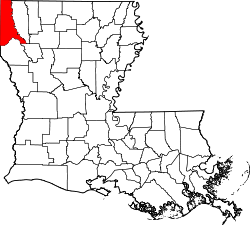Huey P. Long House | |
Formerly listed on the U.S. National Register of Historic Places | |
 | |
| Location | 2403 Laurel Street, Shreveport, Louisiana |
|---|---|
| Coordinates | 32°29′43″N93°46′36″W / 32.49537°N 93.77679°W |
| Area | less than ten acres |
| Built | c. 1905 |
| Architectural style | Colonial Revival, Queen Anne |
| Demolished | September 1992 |
| NRHP reference No. | 91000701 [1] |
| Significant dates | |
| Added to NRHP | June 10, 1991 |
| Removed from NRHP | May 2, 2016 |
Huey P. Long House was a historic house located at 2403 Laurel Street in Shreveport, Louisiana. It was built in c.1905. [2] and was listed on the National Register of Historic Places in 1991. [1]
Contents
The house was destroyed by fire in September 1992, [3] and was delisted on May 2, 2016. [1]



